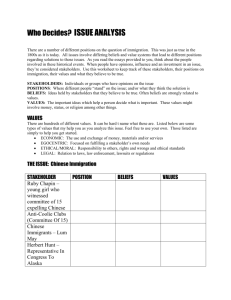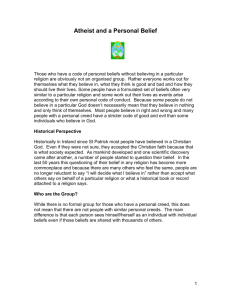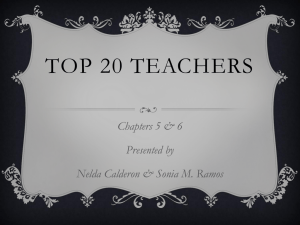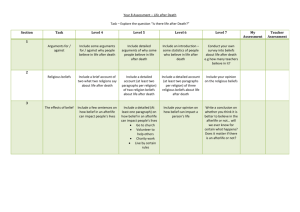Lesson Six
advertisement
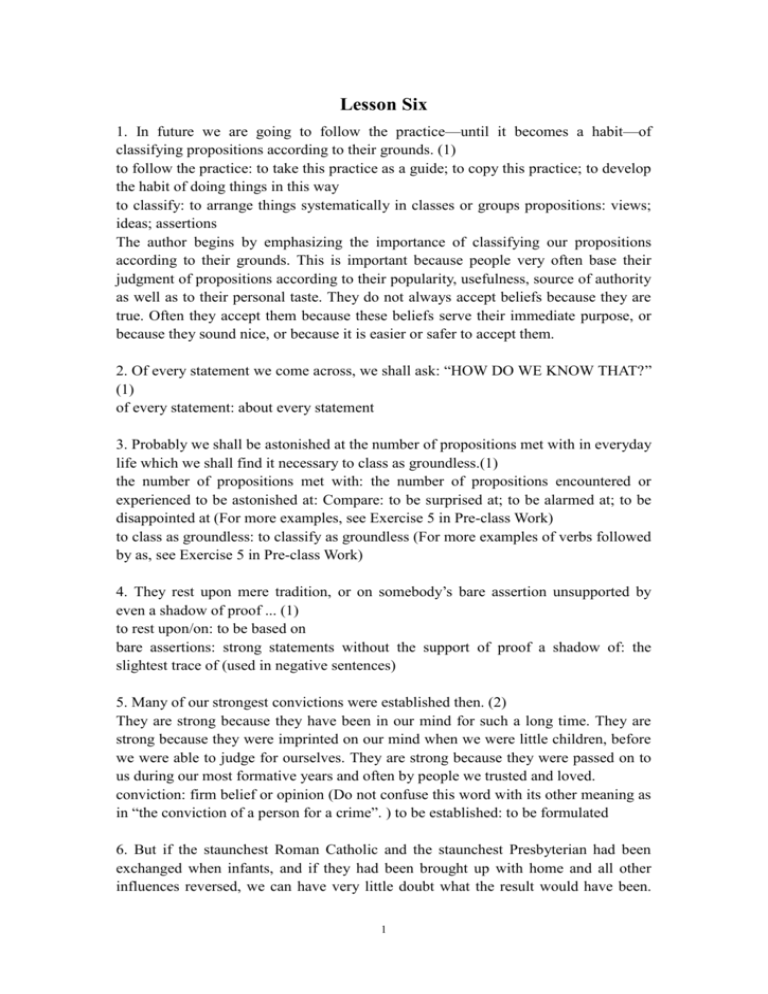
Lesson Six 1. In future we are going to follow the practice—until it becomes a habit—of classifying propositions according to their grounds. (1) to follow the practice: to take this practice as a guide; to copy this practice; to develop the habit of doing things in this way to classify: to arrange things systematically in classes or groups propositions: views; ideas; assertions The author begins by emphasizing the importance of classifying our propositions according to their grounds. This is important because people very often base their judgment of propositions according to their popularity, usefulness, source of authority as well as to their personal taste. They do not always accept beliefs because they are true. Often they accept them because these beliefs serve their immediate purpose, or because they sound nice, or because it is easier or safer to accept them. 2. Of every statement we come across, we shall ask: “HOW DO WE KNOW THAT?” (1) of every statement: about every statement 3. Probably we shall be astonished at the number of propositions met with in everyday life which we shall find it necessary to class as groundless.(1) the number of propositions met with: the number of propositions encountered or experienced to be astonished at: Compare: to be surprised at; to be alarmed at; to be disappointed at (For more examples, see Exercise 5 in Pre-class Work) to class as groundless: to classify as groundless (For more examples of verbs followed by as, see Exercise 5 in Pre-class Work) 4. They rest upon mere tradition, or on somebody’s bare assertion unsupported by even a shadow of proof ... (1) to rest upon/on: to be based on bare assertions: strong statements without the support of proof a shadow of: the slightest trace of (used in negative sentences) 5. Many of our strongest convictions were established then. (2) They are strong because they have been in our mind for such a long time. They are strong because they were imprinted on our mind when we were little children, before we were able to judge for ourselves. They are strong because they were passed on to us during our most formative years and often by people we trusted and loved. conviction: firm belief or opinion (Do not confuse this word with its other meaning as in “the conviction of a person for a crime”. ) to be established: to be formulated 6. But if the staunchest Roman Catholic and the staunchest Presbyterian had been exchanged when infants, and if they had been brought up with home and all other influences reversed, we can have very little doubt what the result would have been. 1 (3) But if they were exchanged when they were infants and brought up in different homes and under different influences, then the staunchest Roman Catholic would be the staunchest Presbyterian, and vice versa. This shows that our beliefs are largely influenced by our surroundings. Presbyterian: a member of the Presbyterian Church, a Protestant denomination when infants: (elliptical) when they were infants 7. It is consistent with all our knowledge of psychology to conclude that each would have grown up holding exactly the opposite beliefs to those he holds now...(3) We can conclude, based on all our knowledge of psychology, that each would have grown up having exactly the opposite beliefs to what they have now. to be consistent with: to be in agreement with. More examples: This practice is not consistent with government regulations. What he is doing is consistent with his basic moral principles. 8. The same thing is true, of course, of many beliefs other than those of a religious nature. (3) Not only are religious beliefs like this. Many other beliefs are, too. other than: This expression usually means “except”, but here it means “apart from”. This usage, however, is not considered standard by many. Notice the pattern “to be true of sth”. 9. If we had grown up in a community where polygamy or head-hunting, ár infanticide, or gladiatorial fighting, or duelling, was regarded as the normal and natural thing—then we should have grown up to regard it as “obviously” natural and perfectly moral and proper. (3) Polygamy, headhunting, infanticide, gladiatorial fighting and duelling are practiced only in some communities or practiced in certain historical times. They are considered immoral, improper and abnormal elsewhere or in modern times. For the meaning of polygamy, headhunting, etc, see Notes to the Text. Notice that the word “community” is often used where in the Chinese context it might be replaced by “society”. 10. Many of our beliefs—many of our most deeply-rooted and fundamental convictions—are held simply as a result of the fact that we happen to have been “brought up” to them. (3) Many of our deep-rooted and basic beliefs are determined by our social or cultural traditions. Ask students to give examples such as the following: 1) China is a large country with abundant natural resources. 2) Man will struggle to conquer nature. 3) Money is dirty. 4) Self-concern is the root of all evil. 5) Those who work with their brain, rule. 2 6) We are now living on the eve of world revolution. 7) Once we have enough food, we will have nothing to worry about. 8) Class struggle is the key link. Once you grasp it, everything else will fall into place. 9) Many hands make light work. 10) We must save every penny to support our national reconstruction. 11. Of course we do not cease... to adopt new beliefs on mere suggestion. . . .to take only the most striking examples, the enormous influence of newspapers and the effectiveness of skilful advertising. (4) Of course it does not mean that when we grow up we no longer have these mistaken beliefs. We still do. We are still easy and often willing victims of newspapers and advertising for example. Newspapers in the West are supposed to bring the truth to the readers. But actually they are often biased. They often tell only half-truths. Sometimes they even tell bare-faced lies. Honest reporting is often censored or banned. As for advertising, political as well as commercial, the purpose is to sell, not to seek truth. Therefore honest advertising is an oxymoron. 12. Much of what passes as such is not, strictly, thinking at all. It is the mere “parroting” of ideas picked up by chance and adopted as our own without question. Most people, most of the time, are mere parrots. (4) what passes as such: what people take as thinking According to the author, most people, most of the time, are mere parrots. They simply copy, echo, or repeat others’ ideas without question. Notice that the author does not mean that we should not learn from others or benefit from the accumulated wisdom of the past. The important thing is that all beliefs should be questioned, reexamined and tested before we decide to accept or reject them. 13. But as we leave childhood, we tend to accept only such new ideas as fit in with the ideas we already hold. (4) to fit in with: to say the same thing or follow the same principle; to agree with If we tend to accept such new ideas as fit in with the ideas we already hold, they are, strictly speaking, no longer new ideas. Therefore it is often the case that when we say we are thinking, we are really rearranging our deeply-rooted prejudices. Experience has told us that it is not easy to develop and accept new ideas. The psychological reasons might be: 1) New ideas require a great effort to discover and absorb, and people have a natural tendency to be lazy (the force of inertia); 2) New ideas always threaten our sense of security, and people usually prefer not to enter what they consider dangerous waters (the fear of the unknown); 3) New ideas imply that our old ideas are wrong, and people feel that they make them foolish. They refuse to accept them in order to save their ego; 4) New ideas always put some vested interests in danger, and people often reject them to cling on to those interests. 3 14. Propositions that are accepted simply because “everybody says so,” must be classed under the same heading. (5) People often do this because group identity is a very strong psychological need. People are afraid of being isolated. They often have a tendency to follow the crowd (to jump on the bandwagon). It is because of this that tyrants often use group pressure to impose their views. And it is because of this that we should learn to defy majoritarian tyranny if we want to stick to truth. 15. It may be part of the traditional belief of the people or the race. (5) A person’s racial, cultural, national, political, class, gender, generation identity, while enabling him/her to see the world in a unique approach, also tends to limit his/her vision. That’s why we need to guard against our racial, cultural, national, political, class, gender, generation prejudices and learn to be more open-minded. 16. But we should fully face the fact that beliefs which are merely inherited from the past must have originated at a time when men knew much less than they know today. So the fact that a belief is “old” is no argument in its favour. (5) One of our common mistakes is to accept beliefs simply on the merit of their long history. But the author is right to say that the fact a belief is old is no argument in its favor. There are many old prejudices which have been proved wrong. However, one might also add that the fact a belief is new is no argument in its favor either, because it has not stood the test of time and is likely to pass like many fashionable things. So we might use the author’s own approach to classify his proposition that the fact a belief is old is no argument in its favor according to its grounds. And we might say it is well-grounded because it is true that many old ideas originated at a time when we knew much less than we do today. But we can also say that it is not so well-grounded because the fact that a belief is old sometimes does mean that it has been proved correct again and again in history. to be inherited from the past: to be passed on from the past in its favor: in its support 17. When we find ourselves entertaining an opinion about which there is a feeling that even to enquire into it would be absurd, unnecessary, undesirable, or wicked—we may know that that opinion is a non-rational one. (7) Another common mistake we make is to judge opinions according to our feelings. An opinion is true because it is true, not because we like it or find it desirable or useful. In fact, truth can often be unpleasant or painful whereas untruth can be soothing and attractive. That is why opinions are often bitterly debated or enthusiastically cherished, precisely because their truthfulness is not established. Notice that to the author, the right question to ask about any opinion is whether it is rational or whether it is true, not whether it is good, necessary, desirable, or important. He obviously believes that in the final analysis, an opinion that is rational and true cannot help being good, necessary and desirable. 4 18. ... we should remember that the whole history of the development of human thought has been full of cases of such “obvious truths” breaking down when examined in the light of increasing knowledge and reason. (8) Examples of such cases: We used to regard the following as obvious truth: that the sun moves round the earth; the earth is flat; the moon is a huge lantern in the sky; the stars we see are all twinkling at this particular moment; the air is weightless; there is always a king; there are always slaves and slave-owners; men are always stronger than women; war is inevitable, etc. to break down: to cease to be useful; to fail to function; to stop being acceptable in the light of: in consideration of; as a result of 19. Again, for more than two thousand years, it was “impossible to conceive” the planets as moving in paths other than circles. The circle was “obviously” the perfect figure... (9) See Notes to the Text. 20. The age-long struggle of the greatest intellects in the world to shake off that assumption is one of the marvels of history. (9) intellect: a person possessing considerable capacity for thought and knowledge to shake off: to get rid of For more phrasal verbs with “off”, see Exercise 5 in Pre-class Work. 21. Many modem persons find it very difficult to credit the fact that men can ever have supposed otherwise. (10) to credit the fact: to believe the fact otherwise: differently 22. An assumed or dogmatic proposition which had been universally accepted as “obvious”; and which, when challenged, was supported by reference to a dogma of Aristotle. Until Galileo actually demonstrated the contrary, nothing could have seemed more beyond possibility or doubt. (12) This is a reference to the well-known story about Galileo’s experiment on the Leaning Tower of Pisa. See Notes to the Text. to demonstrate the contrary: to prove that the contrary is true by means of a demonstration dogma: a principle, belief or a statement of an idea formerly and authoritatively considered to be absolute truth to be beyond possibility or doubt: to be impossible or unquestionable 23. Progress in human thought seems to consist mainly in getting rid of such ideas. (13) Notice the difference between consist in and consist of. to consist of: to be made of or composed of Examples: 5 The company consists of five departments. The book consists of twelve chapters. to consist in: to have a basis in; to lie in; to be found in Examples: Happiness consists in appreciating what you have. Wisdom consists in learning from our own mistakes. 24. Other beliefs are held through self-interest. Modern psychology leaves us no room for doubt on this point. We adopt and cling to some beliefs because— or partly because—it “pays” us to do so. (14) This is obvious and has been proved by psychology. Take for example our belief that human beings are superior to all other species. We hold and cling to this belief because it is in our interest to believe that all other species are created by God (only for those who believe in God) to serve our needs, a view no other animals, in so far as they can have a view, will accept. The author does not say whether it is possible for us to transcend our interest in forming our belief. The answer is yes, but it is possible only when we can forgo selfish considerations. to leave no room for doubt: to make it impossible for people to doubt to pay sb to do sth: to bring benefit or advantage to sb to do sth Examples: It pays to tell people the truth. It pays to forgive others. It doesn’t pay to work too hard at the expense of your health. 25. But, as a rule, the person concerned is about the last person in the world to be able to recognize this in himself. (14) as a rule: generally speaking; usually to be the last person to do sth: to be the least possible person to do sth People who hold those beliefs through self-interest usually will not admit this. They usually try to cloak themselves with beautiful altruistic words. 26. It would be quite wrong to attribute all opinions—even political opinions—to self-interest. But it would be equally wrong to deny that this is one potent factor. (14) Human motivations are complicated. There are other-regarding motivations as well as self- regarding ones. Therefore it is wrong to be cynical and think that all beliefs are based on self- interest. However, we must admit that self interest is a very powerful factor. to attribute to: to regard as resulting from 27. But we may extend the term to cover also his interest in social position; popularity with his fellows; the respect and goodwill of those whose respect and goodwill he values. (15) to extend the term: to extend the meaning of the word; to understand the word in a broader sense 6 The author does not use the word interest in the material sense only. He includes one’s concern for position, popularity, fame, respect, love, etc. 28. There is many a man who is unconsciously compelled to cling to a belief because he is a “somebody” in some circle—and if he were to abandon that belief, he would find himself nobody at all. (15) there is many a man: there are many people to be compelled to: to be forced to to be somebody in some circle: to be an important person in a certain group of people who know each other nobody: an insignificant person 29. Putting it broadly, we should always suspect any of our opinions when we recognize that our happiness depends, directly or indirectly, upon our continuing to hold them—when we might lose anything, material or otherwise, by changing our opinion. (16) If by changing our opinions we might lose something and therefore be unhappy, we must be suspicious about these opinions and try to find out whether we are not being blinded by our self interest. Notice that the author uses the word suspect. It means that it is always wrong to link an opinion with interest. 30. Somewhat similar is the acceptance of an opinion through the desire—probably not recognized by the person concerned—to justify his own nature, his own position, or his own behaviour. (17) We often accept an opinion to justify or defend our weaknesses, mistakes, vulnerable positions or wrongdoings. Here it is no longer the interest to gain but the interest to avoid losing certain things. 31. Many groundless opinions are held through sentimental associations. The thought is associated with memories—pleasant or unpleasant as the case may be—of particular persons who held similar opinions. (18) Very often we like or dislike an opinion because it is held by somebody we like or dislike. This is another common error. The fact is that there is no correlation between the truthfulness of an opinion and the person who holds that opinion. Nice and well-meaning people may have erroneous opinions, whereas unpleasant people may hold correct opinions. 32. In adult life, as we have often observed, a bitter quarrel may change a man’s opinion entirely. Antagonism to a man usually produces some antagonism to his opinions; (19) antagonism: hostility; dislike; hatred There was a time when we believed that we should oppose whatever our enemies supported and support whatever our enemies opposed. This often proved to be wrong. The author has told us why here. 7 33. What keen satisfaction we find in belittling the opinions, or attacking the opinions, of somebody of whom we are jealous, or of somebody against whom we bear a grudge! (19) keen satisfaction: strong satisfaction to belittle: (fml) to make sth or sb seem small or unimportant to be jealous of: to feel angry and unhappy because sb has sth that you do not have to bear a grudge against sb: to continue to feel annoyed about sth sb did a long time ago 34. But, on the other hand, it is equally true that friendly feelings to a man have an effect in disposing us to feel friendly to his views. (19) to dispose sb to do sth: to make sb more likely to feel or think a particular way about sth (Note: This use of the word dispose is not common.) 35. To take one example: how largely our opinions on the merits of certain authors, or poets, or composers, are dictated merely by fashion! We tend very strongly to feel and to believe as others are feeling and believing. Not all others, perhaps; but others of our own set. (20) Our opinions of authors, poets and composers are to a large extent determined by fashion. And as fashions come and go, our opinions also change. merits: good qualities that make sth/sb deserve praise and admiration to dictate: to control and influence; to determine set: a group of people with similar interests; crowd; bunch; circle 36. Once an opinion is accepted, whatever be the cause of its acceptance, it has a strong tendency to persist. (22) whatever be the cause of its acceptance: whatever the cause of its acceptance may be/no matter what the cause of its acceptance may be to persist: to continue to exist or happen Old ideas die hard. That’s why it is not uncommon for a person to enter a new century while his brain remains in the old century. Only a few great intellects can think ahead of their time. Most people suffer from mental inertia or cultural lag. 37. The “brain path” becomes so well worn; the pattern of brain-centres becomes so well connected up by continual use, that the nerve current finds a route of practically no resistance, and so it always takes almost exactly the same course. (22) We tend to hold old ideas (It’s easy to fall into a rut) because they are familiar and make us feel secure and comfortable. They are comfortable because we are following the same brain path which offers no resistance, and our thinking (The author calls it nerve current) tends to follow the easy path the way water flows along a course which has the least resistance. worn: old because it has been used for a long time brain path: thought habit; the way you always think 8 brain-centres: (Note that in this essay, the British term is used because the author is British.) It should be nerve centres. resistance: 阻力 38. We all know the person who has a string of stock anecdotes. (23) a string of: a number of (similar things); a series of stock anecdotes: stories about your personal experiences that you keep telling people whenever you can think of nothing else to tell 39. Put them on to the “record” about the good old days; or about prohibition; or about the wicked capitalist; or about the lazy and improvident workers; or about the country going to the dogs; or about the modern girl •••, and nothing on earth can stop him—until the “record” has run out! (23) Put them on to the “record”.., and nothing can... : If you put them on to... then nothing can… Notice that the conjunction and here introduces a clause of consequence. If you start them talking about these things, they will repeat themselves just like the playing of an old gramophone. good old days: happy days in the past (One favorite subject for many people is how everything used to be better. ) For prohibition, wicked capitalist, etc, see Notes to the Text. until the “record” runs out: until the “record” is played out; until they have nothing more to tell 40. After they have been held a certain length of time, they become, as it were, so stamped in by continual use that it is almost impossible now to change them. (24) as it were: as you might say; so to speak to stamp in: The usual expression is to stamp out. To stamp in is coined by the author, and therefore he said “as it were”. 41. Thus we become, in James’s term, Old Fogeys. (24) See Notes to the Text. Old Fogey: a person who is excessively old-fashioned in attitude, ideas and manners etc 42. Sometimes our thought-patterns set while we are still quite young. In a few rare cases they remain open or alterable even into old age. (24) Sometimes our ideas and thought habits are fixed when we are very young, and therefore we are unable to absorb new ideas. Only in a few rare cases people will still be open to new ideas when they are old. to set: to become fixed 43. Yet when full allowance has been made for all these non-rational factors in the determination of opinion, there remains—not in all minds, not in most minds, but in some—a desire to discover the facts; to think things out in a clear and rational way; to 9 get at the truth at all costs, whatever it may turn out to be! (25) Yet in spite of all these factors which make it difficult for people to form their opinions rationally, there are still some people who have a desire to think in a clear and rational way; and to do everything possible to find the truth, no matter whether the truth is pleasant or unpleasant. to make allowance for: to consider sth when making a decision Examples: We must make allowance for unexpected factors when we give our forecast of next year’s economic performance. Even when full allowances were made for the unusually favorable conditions we had last year, our achievement was still remarkable. 10


